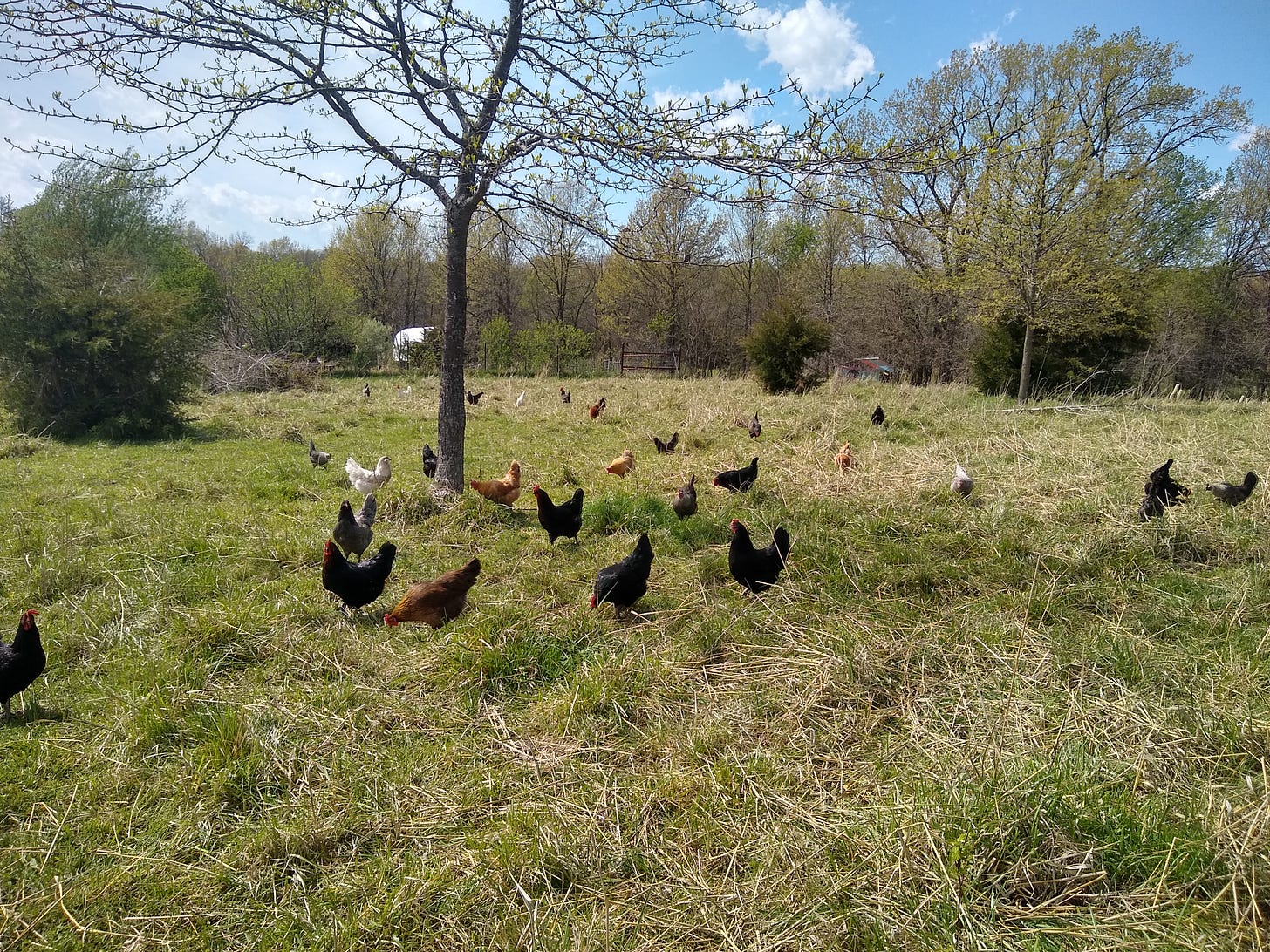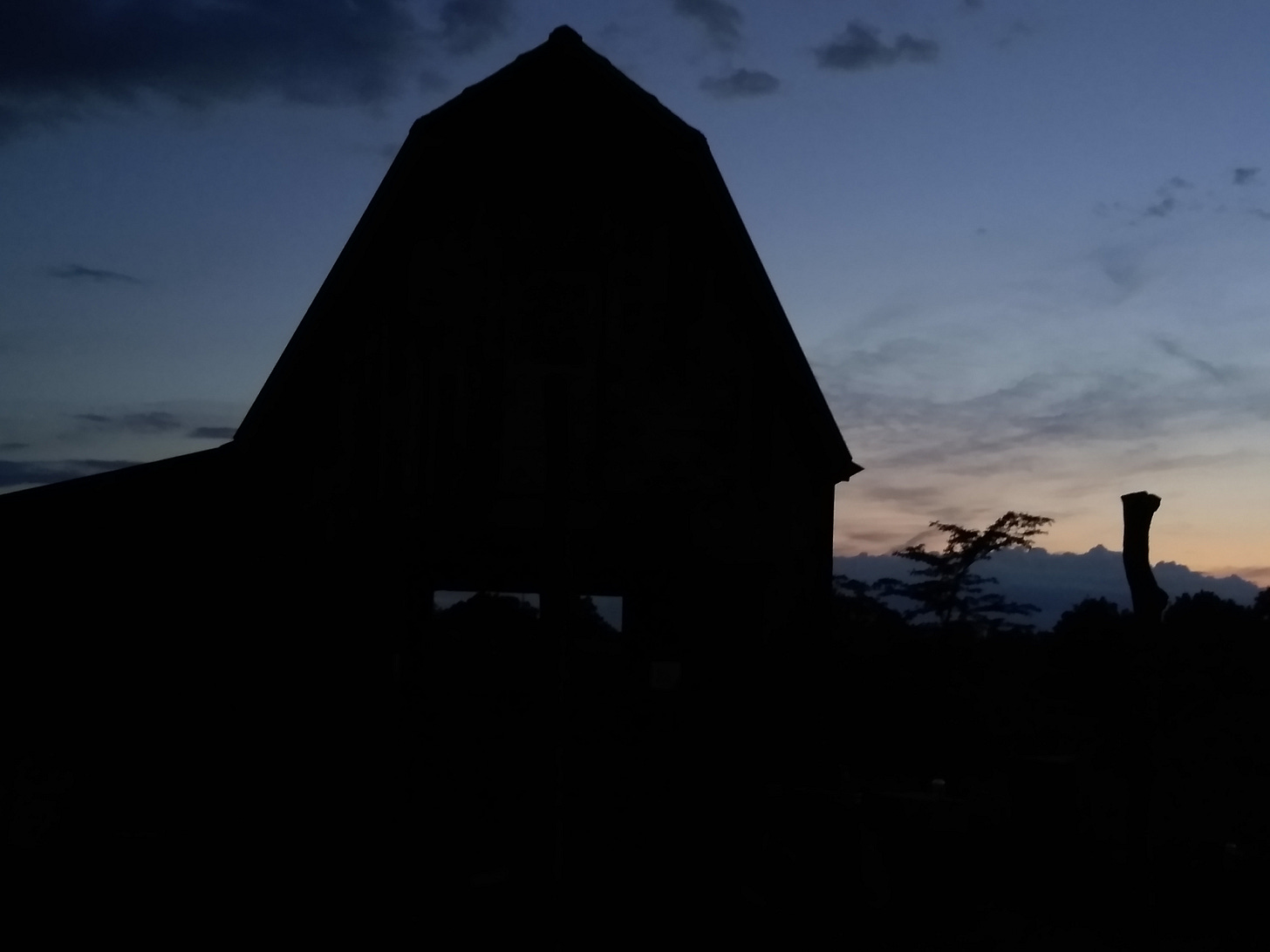Varmints, Rust, and the Geology of Failure
Will our roots break through and make good our intention?
I am currently locked in a stalking match with a red fox, and she’s winning. She bounds through windblown grass on the field edge deftly, breaking the necks of barn fowl with her bloody smile as I stumble through the brambled draws over muddied feathers and through buzzing carrion flies. I haven’t found her den, but I can trace her path through the billowing grass. She arrives at the most lethargic hour… 4 PM… when the dogs are laid out, asleep in the shade of barns and the chickens are dust bathing ‘neath the cedar boughs. I don’t know what I would do if I ever found her vulnerable. I don’t expect this will happen, and rather, expect the opposite. For all I know, it could be two foxes.
I value native habitat and wildlife, even as a farmer. Fox attacks have been a part of the cycle of agriculture here– not every year, but every few years, a vixen will den up and deliver kits nearby. While the kits, born hairless, blind, and unable to thermoregulate are most vulnerable without their mother, the father fox, or perhaps another social relative, will hunt on the mother’s behalf. Some weeks later, we might even spot the mother taking her kits out to learn to hunt, and the dozen or so chickens which do not stay within the safe confines of fenced pasture with our guardian dogs become fair game. I’ve long felt that losing a small percentage of livestock to predation is an acceptable tax for deriving so much from the landscape. But three hens in three days exposes some mistake in my current management, and portends a looming problem.
I think that at our best, farmers can be important and fair intermediaries between the needs of human civilization and the natural world. It means we have to reckon with the privilege, and responsibility of land stewardship. The continual and near complete loss of common land through political and economic mechanisms of colonization, enclosure, and speculation has divorced entire populations from the source of their sustenance. Those of us with the privilege of land access, particularly on arable soils, should necessarily feed others. And, we must do the work of conservation and stewardship when those arable soils intersect with native habitat and threatened ecosystems. If a fox takes a few birds, then I have fed a fox and nourished her kits, and perhaps this will result in a more balanced population of rabbits. In the context of balance (though static equilibrium in any ecosystem is a fallacy), flora and fauna more threatened than foxes or cottontails might better thrive. But if all I do is feed my poultry to foxes, I won’t be feeding people, not in a way that is efficient, or responsible in relation to the privilege of my land access.
I also bear a responsibility to my livestock. While chickens are unable to make an agreement or give consent, I feel that there exists a certain contract between us, that I will take their eggs and flesh, and they will receive care, food, water, adequate shelter, the right to engage in their full range of natural behaviors, and a life reasonably free from stress or fear. In years past, before we began employing working dogs, foxes, weasels, and owls would sometimes go on multi-day killing sprees. Animals and humans don’t share the same emotional range, as far as I can tell, but contentment, fear, and stress seems to be where we can relate, and I have seen palpable fear in flocks where a dozen birds get killed in an evening– and I take it as my end of the contract to reduce that fear.
This morning has been marked by sore joints, light rain, still air, and the mournful cooing of treetop doves. Most of the trees, excepting some frost-damaged mulberry, and the slow to wake boughs of hickory and pecan, are fully leafed out, and full of birds, sometimes common, sometimes just wayfaring warblers stopping in for a quick roost. Swishing through the rain in rubber boots alongside the feather-strewn draw and down to the herd of grunting hogs lined up at the edge of their paddock, my toe dislodged a flattened, rectangular shard of rusty metal– and I recognized it as one of the old black speckled enamel camp cups I moved here with over a decade ago, flattened by tractor tires and pressed into the mud, dissolved overtime by oxidation, the shining rim crumpled and somehow still glinting, but the rest a disintegrating husk of rust embedded with wet clods of dirt.
The draws and ditches of this place hold a fair bit of detritus from the past– lichen-frosted wagon hubs and cloudy old glass bottles, smashed up galvanized gravity hog feeders flaking with rust, seized-up bearings and despondent Fridigaires, and at least one sinking, decaying Chevy from the 1960’s. I generally stray from these middens in my day to day work, but on occasion, in pursuit of a Magnolia warbler or some wild mushrooms, I will stumble into these graveyards of dissolved farms and wonder under what circumstances did these things make it here? The standard practice in these parts is to bulldoze what cannot be burnt– assuredly some of this stuff was pushed into the ravine by its owner, but some of it was left behind for others to contend with, the standing record of farms and families gone by the wayside.
Grasping this crumbling relic of my own life, archaeological remnants from a time when my body was younger and my idealism was largely unencumbered by experience and cynicism, I am beginning to see the materialization of my own layer of strata, the next course of flattened tin and stripped bolts and time spent trying not to slip from the edge between failing to do right by the folks I am trying to feed, and failing to do right by the land upon which I perform this tightrope act. Trucks rust, and barns crumble, and even the straightest, strongest fences fall down, and in short time, fallow fields come back up in brambles and pin oak. My concern here isn’t to do with a legacy, but with failure.
Much of our clay soil here is underlaid with a plow pan– a compacted layer of earth formed from repeated tillage over time. Roots struggle to break through it to gain access to the nutrients below, and moisture can perch on top of it in heavy rains, causing plants to flood or rot, while simultaneously finding it difficult to penetrate deeply enough as a reserve for heat and drought. Other than this compressed layer of clay particles and the thin and scoured topsoil, the agricultural legacy left to us here has largely been pushed into the draws, save for a few old waterers, and weathered hedge posts laced with brittle wire. Each pass of the plow is a wager that the short-term profit of what can be grown (or have insurance claims collected on) will somehow offset the longer-term loss of soil integrity, until things somehow change for the better, or you die and it becomes the next poor bastard’s problem. Our failures as farmers, and our inability to address them, are becoming a part of the fossil history, and I am beginning to fear that my own project is only adding another decade of failure to the geologic record, as I transition from being the next poor bastard to being the latest in a series of previous poor bastards to lead a life of desperation and strife here.
Failure is certainly an option, and I wouldn’t listen to anyone who tells you otherwise. It arrives in spite of our own best intentions, waits unseen in the windblown grass, and puts its teeth around our necks when we are most vulnerable. I have seen many good, smart, hard working people fail, especially in agriculture. The more my joints ache, the more exhausted I become, the more I watch opportunities fade and markets shift and fade, the more I feel like those hapless hens choosing to live a life outside the fence. I do not want to become prey, but I’m choosing to accept the inevitability.
This season has been a slog in the muck, though I’m grateful for the moisture. On any given farm task I am somewhere between two days and five weeks behind, though I fear I may have transplanted some crops a bit early. The biggest thing I’ve learned about successful farming is timing, and my timing has been off, on account of factors like weather, finance, and general bodily decrepitude. The transition into spring has been pleasant and gradual in many ways, belying a false sense of spaciousness, but with the recent bouts of humid days, the shady enclosure of leafy canopies, and the rapid emergence of garden weeds, I’ve often been finding myself paralyzed with panic.
When the sky is clear and the weather pleasant, I watch cabbage moths flutter along rows of kale, graceful in their lackadaisical dance, a harbinger of hungry cabbage worms. Here at my desk, I have once again pushed aside the ever-growing pile of financial tasks and obligations for another time in favor of putting words on pages– a sometimes consoling practice whenever it doesn’t further deplete my scattered attention. There was no Almanac last week, though I did write a few thousand words down. None of them were right. Bills, exhaustion, depletion, and a lack of inspiration– these things have sent many farmers to early graves, and seen the relics of their enterprise pushed into ditches by the ever grinding tractor buckets of time passing.
On the night when the aurora borealis was most brilliant here in Northeast Missouri, standing out on the gravel road and gaining a glimpse of the heavens on fire, I could hear the far-off whine of machinery, as planters ran across plowed earth, pressing seed to soil in preparation for warm spring rains. Out in the darker reaches of the shadows, foxes were stripping flesh from bone. I have sworn that this will be the last year I raise pastured pigs for market– and I would have sold them off months ago if I didn’t feel that this would likely result in a breach of contract between myself and my livestock. We have planted many trees as an alternative path forward, and I hope that this panic-inducing spring weather will help them to thrive, and that their taproots can reach deep and break the plow-pan of previous folly.
Until then, I suppose you will find me somewhere along the draw edge, unsure of my footing in these blood-flecked tussocks of grass, a paddock full of swine squealing for me to keep my end of the bargain. In my hand, I’ll have this remnant of an old tin cup. When I’m ready, I might just chuck it in the draw, to be further subsumed by time and decomposition, and left as testament to what could have been. But not today. I’m far too busy, and the world is too hungry, and I don’t think we’re out of enough tricks to justify failure yet.





